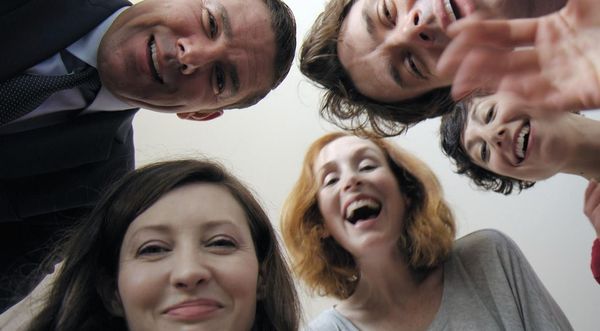Eye For Film >> Movies >> All I Want (2017) Film Review
All I Want
Reviewed by: Jennie Kermode

What do you do when you and your spouse love each other, enjoy the same places and activities and have the same friends, but don't want to be in a relationship anymore? In the UK, the idea of splitting up but remaining friends isn't particularly remarkable, but the tendency of US culture to focus everything on finances, combined with an intensely adversarial legal system, makes it more of a challenge. It's for this reason that the much-maligned term conscious uncoupling entered the lexicon - actually invented by psychotherapist Katherine Woodward Thomas and not Gwyneth Paltrow, who claims that in her case it was applied by an editor. All I Want is the story of a couple attempting to consciously uncouple. They want their friends to understand. So they announce it at the long-planned celebration for their tenth wedding anniversary.
There are some well placed observations in this story: Andrew (Drew Rausch) trying to rekindle something through sex when it's obvious that Mel (Melissa Center) has lost any sexual interest in him and finds his persistence part of the problem; the assumption among their friends that one of them must have had an affair; the attachment of blame along strict gender lines. The calm on the surface aggravates those who are convinced it must hide some terrible secret Others take it personally: having been together for longer than others in their social circle, Andrew and Mel have come to be perceived as a locus of stability, so their decision creates a sense of chaos. The conceit of the party and the soon-to-be-divorced couple's insistence that the guests stay enables writer/director Liang to pack all these issues into a compact space.

It's a strong idea that flounders somewhat in the execution. Supporting characters are too thinly drawn and we don't really see the bonds that exist between them and the central pair - too much is told, not enough shown. Center, who co-wrote the script, is a much bigger presence that Rausch, something that might have been built into the story but that, in the absence of that, makes the film feel unbalanced. The expositionary device of a hippy ritual in which characters are persuaded to share their feelings round a fire results in conversations that are awkward in the wrong ways, revealing little about the characters and delivering little to the viewer. The whole thing feels very Californian, which is fair enough but will limit its potential elsewhere.
This is Liang's feature debut and he has bitten off more than he can chew, perhaps underestimating the challenge of telling simple stories well. It has its moments, however, especially in the attempt to understand how traditional ideas about romantic relationships intersect with a changed attitude to social support and friends-as-family.
Reviewed on: 20 Jun 2017
















